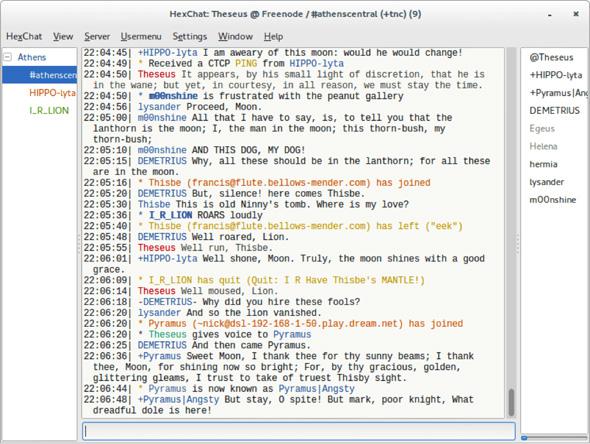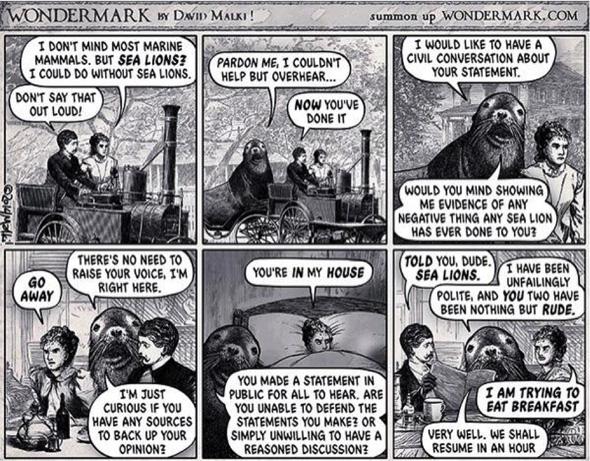From mere faux pas to outright harassment, Twitter increasingly acts as a pressure cooker for the worst of humanity. Longtime literary troll Ed Champion was finally suspended from Twitter last month after trying to blackmail a writer in real time. The death of Brenda Leyland, the “Twitter troll” who harassed the parents of an abducted child, is another reminder that Twitter is the best place to hurl abuse and get noticed for it. And Twitter is partly to blame for all this—not because of its policies, though they could use improvement, but because of its very structure. Marshall McLuhan was right: The medium shapes the discourse.
Champion and Leyland were social media villains, but even everyday discourse gets ugly fast on Twitter. How many seemingly normal people have revealed their worst selves on Twitter? There was the PR executive who tweeted a racist joke about AIDS in Africa before getting on a plane; she lost her job shortly after landing. The already prickly scientist Richard Dawkins looks even worse in tweeted form, as when he advised a woman to abort her fetus if it had Down syndrome.
But the full spectrum of Twitter’s defects only became known to me as I have been covering the #GamerGate imbroglio, the ongoing and increasingly incomprehensible angry-gamers-vs.-angry-journalists public relations nightmare that started over a month ago. GamaSutra editor-at-large Leigh Alexander wrote a “gamers are over” article in which she called gamers “these obtuse shitslingers, these wailing hyper-consumers, these childish internet-arguers.” Her article prompted Intel to pull an ad campaign from GamaSutra last week, presumably on the grounds of needing those hyper-consumers’ money. Alexander’s Twitter stream is arguably even less temperate, with remarks such as “it’s funny how dudes who are ‘aspiring games journalists’ tweet bullshit at me as if I cannot instantly kill all their dreams” and “maybe mean of me to burn a young female writer but, sorry, this is not gonna be a career for her.” I doubt that GamaSutra would have published her statement that actor and GamerGate supporter Adam Baldwin “jacks off goats.” You are a professional writer who has just written that a mainstream actor who disagrees with you masturbates goats. What is going on with you?
Possible answer: Twitter is what is going on with you. In a great guest post on Damion Schubert’s blog, Schubert’s fellow game designer Dave Rickey declared that, in the case of GamerGate, “Twitter is a breeding ground for social dysfunction,” where whatever subtleties may have lurked in those “gamers are dead” articles were reduced to blanket statements such as “Regardless of race creed gender or religion you can still play games and therefore still be garbage.” Rickey pointed to the 140-character limitation and its tendency to encourage mindless agreement (or disagreement), but that’s secondary to the bigger problem: that Twitter breaks the public/private divide in a way that people simply can’t cope with.
Twitter’s founders initially formulated it as a broadcast tool to publish announcements to your friends and to the world, and to that extent it works fine. But once dialogue is taking place, Twitter becomes a cocktail party where everyone has a megaphone. Twitter lets you shout in public—so imagine everyone trying to shout conversations with one another in a public space. Alexander may have felt like she was broadcasting to her friends, but she was actually broadcasting to the world. Likewise, I suspect Borderlands 2 writer Anthony Burch doesn’t actually think that GamerGate “legitimizes and furthers … CP [child pornography],” but nonetheless he made the remark on Twitter in a fit of pique and faced hundreds of outraged responses (“Burch, you have a fucking screw loose if you think anyone condones CP”) and complaints to his boss. Dell executive George Reese was, I pray, being hyperbolic when he said Monday that “The #Gamergate cabal are the technology world’s ISIS,” but try telling that to the poor Dell employees who have to deal with the ensuing chaos.
People are accustomed to being irreverent in conversations with friends, but on Twitter, anyone who might take offense is likely to overhear (unless your tweets are protected, but why be on Twitter in that case?). At least you can go on Reddit without having the repugnant Philosophy of Rape subreddit being shoved in your face; Twitter drags everyone down to the bottom. No matter whom you unfollow, mute, or block, someone you do follow will sooner or later draw your attention to an outrage and encourage you to join the condemnation. On Twitter, negativity is viral.
Twitter is, for better and for much worse, a unified public space. Worse, its design stresses conflict and impedes consensus. Once five or 10 people who disagree with you descend, it is very difficult to keep the original conversation going, since Twitter’s threading of conversations is nightmarish. Not only do you lose tweet space as a conversation gains more members, but as tweets branch off with different combinations of people, it can be impossible for any one person to see the entire conversation. Last week I was pulled into an impromptu (and unsuccessful) attempt to try to calm some of the GamerGate flames, where I quickly drowned in the multi-ply conversation; instead, I set up an IRC chat room where the space felt roomy and calm and the conversation became natural, civil, and unforced. That was the moment when I realized Twitter is hell.

Courtesy of HexChat
IRC, which has been around for 25 years, offers everything for conversation that Twitter doesn’t: topic-based chat rooms that you can drop in and out of, a real-time roster of participants, and a single complete stream of conversation. The focus is on the community rather than individuals, and so support is given to consensus rather than the sea of antagonistic individuality that’s on Twitter.
On Twitter, the line between discussion and harassment is slippery. As soon as people overhear something they don’t like, they can drop in. If a lot of people hear something they don’t like, you will get swamped, and since you are always alone on Twitter—dependent on your friends happening to see replies addressed to you before they can jump to your defense—it can be discomfiting if even one of those people is less than friendly. Moreover, even if your critics have the most impeccable manners, it’s easy to become defensive and even scared if a dozen people simultaneously and independently disagree with you.
When does incessant polite disagreement become harassment? Essayist and Jeopardy! enfant terrible Arthur Chu eloquently summarized the paradox this way: “#GamerGate isn’t abt harassment as long as you define barraging ppl w questions abt shit that’s not your business as not harassment.” Cartoonist David Malki satirized Gamergate supporters’ habit of spontaneously (though politely) dropping into Twitter conversations criticizing their movement in his “The Terrible Sea Lion” strip on Sept. 19:

Courtesy of Wondermark.com
Even GamerGate supporters conceded that the “Sea Lion” cartoon made a fair point (and it’s since become a running gag, with some GamerGate members calling themselves sea lions). But not all such intrusions are so well-mannered. I have already written about the terrible harassment visited upon Zoe Quinn and Anita Sarkeesian both on and off Twitter, as well as the articles that blamed “gamers” en masse for the harassment and inflamed the conflict tenfold. Now that kind of harassment has become a constant threat to anyone taking any opinion about GamerGate on Twitter, particularly if she’s a woman. Gaming journalist Liana Kerzner made serious efforts to bridge the gap between journalists and GamerGate supporters in the hopes of reducing harassment, only to suffer a tremendous amount of harassment herself from GamerGate supporters.
Because the only way to identify a topic of discussion is to use a hashtag, complex topics are often reduced to a catchphrase and turn into flashpoints. Any remotely controversial tag is basically a Kick Me sign (or Kick Me spotlight), whether it’s #YesAllWomen, #GamerGate, or #CancelColbert. And in the case of a disorganized movement like GamerGate, anyone using the #GamerGate tag is frequently identified with the worst harassers who use the tag, and is treated as such.
Consequently, harassment has also been directed in return at GamerGate supporters themselves, who at this point endure constant doxing and torment of their own members; hashtag searches makes finding harassment targets easy. An unfailingly civil university professor who supported GamerGate on Twitter was doxed, told she was a “self hating fucker,” and warned that if she didn’t stop posting, “its time to just shove something metal and sharp in the closed up cunt of yours and twist.” Another anonymous woman was simply told, “I know where you live [and] know who your family is. Stop posting about #gamergate.” Such occurrences are now commonplace.
After cartoonist K. Thor Jensen got much flak for tweeting that all gamers should die, he apologized and concluded on this wise note: “Hashtag activism is an ineffective way of pursuing those goals. It literally gets you nowhere but pointless arguments with turds like me.” Even Jensen’s attitude that “Ed Champion has always been human shit and should be flushed down a toilet,” however accurate, would probably be phrased a bit more tactfully and substantively anywhere else. Twitter is a verbal minefield that encourages harassment while discouraging productive conversation, bringing out the worst in everyone from Leigh Alexander to Richard Dawkins to Donald Trump (not hard, admittedly). I dream of Twitter being reduced to trolls and moral scolds, forced to live with each other for eternity, while the rest of us move on to healthier spaces, free of “these obtuse shitslingers, these wailing hyper-consumers, these childish internet-arguers.”
